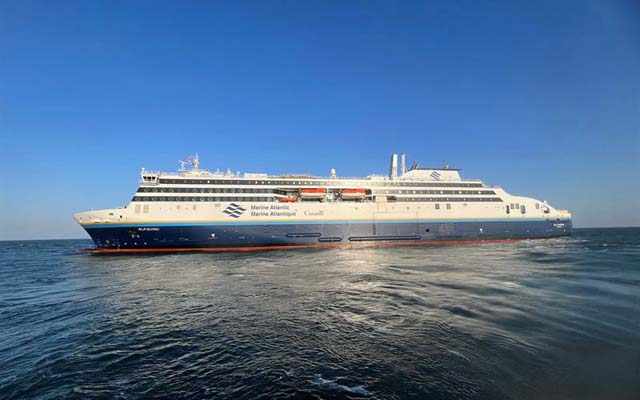Wärtsilä has designed and delivered controllable pitch propellers for Stena’s new ro-pax vessel, ‘Ala’suinu’, which has now successfully completed sea trials.
Following these sea trials, Ala’suinu became the first ro-pax vessel to fulfil the DNV Silent(E) notation, satisfying the criteria in the operating conditions at 11 and 18 knots. This environment class notation from DNV was introduced to protect sensitive marine ecosystems, applying to vessels that demonstrate the ability to effectively reduce emissions of underwater radiated noise.
The Ala’suinu, which was built at CMJL Shipyard (Weihai) in China, is under a five-year lease to Marine Atlantic, a Canadian operator based in province of Newfoundland and Labrador. Environmental sustainability was a prime consideration in the design of the 203m ship, which will sail between Nova Scotia and the island of Newfoundland from June 2024.
Capt Anderson Noel, Marine Atlantic Director Fleet Operations, said: “The Ala’suinu is a specially designed vessel for Marine Atlantic. We are fully committed to reducing the environmental impact of our operations, and in this vessel another dimension of sustainability has been added. The dedicated Wärtsilä propeller design enables us to minimise underwater noise for the benefit of marine life off Canada’s coasts.”
Øystein Solheim Pettersen, Head of Section, Noise and Vibration, DNV, added: “With this notation, Stena and Wärtsilä are showcasing their commitment to taking proactive steps to reduce shipping’s environmental footprint. Despite ro-pax being a challenging ship type from an underwater noise perspective, this innovative machinery configuration has enabled a propulsion plant with sufficiently low noise emissions to satisfy our voluntary class notation Silent(E).”
During the design process of the CP propeller, Wärtsilä’s in-house design team paid special attention to underwater radiated noise as a key design parameter. This was done without compromising on other important propeller design requirements, such as ensuring optimal performance and efficiency. As well as reducing emissions of underwater radiated noise, Wärtsilä’s propeller ensures that owners and operators gain the benefits of lower operating costs and a reduced environmental footprint through lower fuel consumption and fewer exhaust emissions.
Bernd Bertram, VP Propulsion, Wärtsilä Marine, said: “For this project, we have designed and delivered propellers where vibrations and noise have been given the highest attention, in combination with the vessel design and operations. The vessel being awarded with the Silent(E) notation by DNV after successful testing at sea verifies the environmental benefits. We are proud to be the first on the market to deliver the dedicated propeller for a Silent(E) classed ro-pax vessel.”
In addition to the dedicated propeller, Wärtsilä supplied an integrated hybrid propulsion system for this vessel, consisting of Wärtsilä 46DF main engines, Wärtsilä 20DF auxiliary engines, both of which are complemented with Wärtsilä NOx Exhaust gas cleaning system and Wärtsilä LNGPac, as well as the reduction gear boxes and bow thrusters with motors. Also included in the scope are the hybrid DC-link shaft generator system, batteries and energy and power management system, integrated automation system, and navigation amd external communication system.
Image: Wärtsilä CP propellers have cut noise pollution for Stena’s new Ro-Pax vessel, ‘Ala’suinu’ (credit: Stena RoRo)



